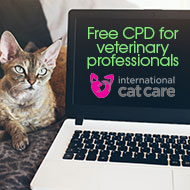
Enables open access to free webinars hosted by veterinary specialists
In order to support veterinary professionals during the COVID-19 pandemic, the International Society of Feline Medicine (ISFM) has announced that it will be enabling free access to its webinar channel.
ISFM has opened up the channel to help veterinary professionals keep up-to-date with CPD during this difficult period. The resource includes more than 40 webinars presented by veterinary specialists, on topics such as anaesthesia and analgesia, neurology, behaviour and nutrition. Each webinar provides one hour of CPD, with a certificate available to download.
A new webinar is also included titled ‘COVID-19 – helping cats cope’ recorded by feline behaviourist Lucy Hoile, which provides information on advising owners to help their cats deal with changes at home.
Sam Taylor, feline medicine consultant at ISFM, commented: “ISFM is committed to educating veterinary professionals on all things feline, so we are delighted to be able to bring some of our normally member-only benefits to a wider audience during this challenging time.”
ISFM’s parent company International Cat Care has also released a webinar designed specifically for cat owners called ‘COVID-19 – meeting your cat’s needs’ presented by cat behaviour counsellor Vicky Halls.
She said: “Changes in household routines and adults and children spending more time at home can make this a stressful time for our pet cats. However, there are a lot of simple things which we can do as cat owners to help them cope, and I will give you lots of tips during the presentation on how to achieve this.”
For more information, or to register for the webinar channel please visit the International Cat Care website.



 The Veterinary Medicines Directorate (VMD) is inviting applications from veterinary students to attend a one-week extramural studies (EMS) placement in July 2026.
The Veterinary Medicines Directorate (VMD) is inviting applications from veterinary students to attend a one-week extramural studies (EMS) placement in July 2026.